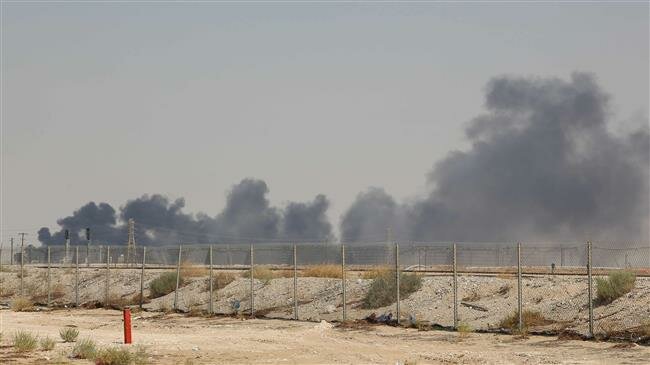What you need to know about the Yemeni blows on the enemy!
YemenExtra
Y.A
Military experts said that military operations against Saudi aggression , backed by the US, will continue in response to their aggression and killing of the Yemeni People, which lasted for five years without any justification.
Yemen’s military has warned foreigners in Saudi Arabia to leave Aramco’s oil processing plants, saying they are still a target and can be attacked “at any moment.”
The warning came after Houthis and their allies in the Yemeni army deployed as many as 10 drones to bomb Abqaiq and Khurais oil facilities run by the Saudi state-owned oil company before dawn Saturday.
US Secretary of State Michael Pompeo was quick to blame Iran for the brazen attacks, claiming there was no evidence the drones had originated from Yemen.
Analasyats mocked the proposition, saying Washington resorted to such rhetoric to hide the fact that their radars were simply incapable of tracking Yemeni drones.
US CNN published an article by Tim Lister under the title of “Game Changer in Gulf.” The article is examining the effects of several projectiles struck the Abiqaiq plant, starting a series of fires that quickly took out nearly half Saudi’s oil production — 5% of the global daily output — and sparking fears about the security of the world’s oil supplies. It’s unclear when Abiqaiq, which is operated by Saudi giant Aramco, will be fully be operational again.
Ansarullah in Yemen claimed the attack, saying that 10 drones had targeted Abiqaiq, as well as the Khurais oilfield.
The writer stated that “Ansarullah has announced that the facility was hit by ten drones targeting Abqaiq and Khurais field, but US Secretary of State Pompeo accused Iran while Iranian Foreign Minister Zarif responded that Pompeo was involved in deception, noting that blaming Iran would not end the disaster.”
Even so, the maximum range of this system, dubbed the UAV-X, would be between 740 and 930 miles (1,200 and 1,500 km), depending on wind conditions. The distance from Houthi-held parts of Yemen to Abqaiq is about 800 miles (1,300 km).
Sandy Fielden, an analyst at Morningstar, a global financial services firm based in the US, said on Saturday that the current oil stocks in Saudi Arabia, the biggest oil exporter in the world, would not suffice to compensate for a loss of around 5 million barrels per day (bpd) that could be caused by attacks earlier in the day targeting the kingdom’s vital oil facilities located east of the country.
The attacks “resulted in a temporary suspension of production at Abqaiq and Khurais plants,” Prince Abdulaziz bin Salman, the energy minister said in a statement carried by the official Saudi Press Agency. It led to the interruption of an estimated 5.7 million barrels of crude, or about 50 percent of total production, he added.
Abdel Bari Atwan editor-in-chief of the Rai al-You news website and famous Palestinian journalist, has described the attack on the Saudi Aramco facilities at Abqaiq and Khurais plants as one of the most serious and important attacks on Saudi Arabia, saying, “You can not imagine what this attack means, not only to Saudi Arabia but to the entire world. 7 million barrels of oil are being processed at the Abqaiq and Khurais Refineries every day, meaning that all the world’s markets will be affected,” .
“Where is Trump and his billions that he has blackmailed under the title of protection? Where are his Patriot missiles? Why didn’t the US satellites film even an ant? How did Ansarullah change the military equations? What is Aramco’s fate?” Atwan asked.
Two sources close in the Oil market said 5 million barrels per day of crude production were impacted — close to half of the kingdom’s output or 5% of global oil supply. Another source said some production was shut down as a precaution and that most of the lost output capacity would resume within days.
State television, citing its correspondent, said there were no casualties, but there was no official statement. A Reuters witness nearby said at least 15 ambulances were seen in the area and there was a heavy security presence around Abqaiq.
Al-Jafri said in a televised interview on Al-Alam News Channel today that the operations carried out by Yemeni Air Forces on Saudi aggression is the strategy of balancing deterrence announced last month. He added that operations against aggression will continue through the Yemeni Rocketry Force, which is considered as one of the strategic weapons in the theater of operations to the battle, which went beyond geography and rules of engagement as a deterrent.
In March 2015, the US -backed –Saudi-led coalition started a war against Yemen with the declared aim of crushing the Houthi Ansarullah movement, who had taken over from the staunch Riyadh ally and fugitive former president Abd Rabbuh Mansur Hadi, while also seeking to secure the Saudi border with its southern neighbor. Three years and over 600,000 dead and injured Yemeni people and prevented the patients from travelling abroad for treatment and blocked the entry of medicine into the war-torn country, the war has yielded little to that effect.
Despite the coalition claims that it is bombing the positions of the Ansarullah fighters, Saudi bombers are flattening residential areas and civilian infrastructures.
More than 2,200 others have died of cholera, and the crisis has triggered what the United Nations has described as the world’s worst humanitarian disaster.
#YemenCantWait #YemenGenocide #Yemen #Yemencantwait #YemenGenocide #Yemen_children #StoparmingEmirates #StoparmingSaudi #Stopthewaronyemen#LivingInYemenOnTheEdge#SoldarityWithThePeopleOfYemen

